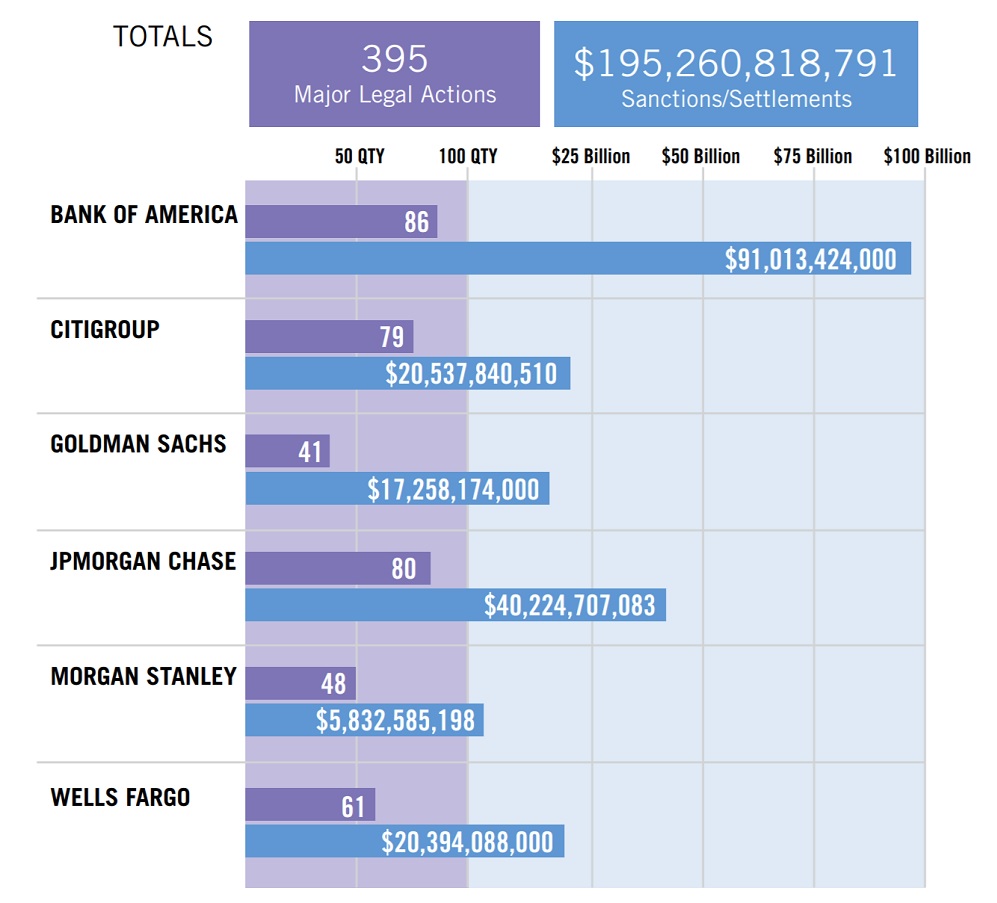
Top U.S. banks have racked up almost $200 billion in fines and penalties over the past 20 years from illegal activities in 395 major legal cases. Bank of America tops the list, followed by JPMorgan, Citigroup, and Wells Fargo, according to a new report, which also covers Morgan Stanley and Goldman Sachs.
Big Banks’ $200 Billion in Fines
Bank of America, Citigroup, Goldman Sachs, JPMorgan Chase, Morgan Stanley, and Wells Fargo have collectively racked up $195 billion in fees and penalties, according to Washington-based advocacy group Better Markets. The fees and penalties from 395 major legal cases since 2000 were disbursed among government agencies, investors, and consumers harmed by the banks’ conduct.
The report finds that “the banks’ behavior is deteriorating because it finds their conduct since the financial crisis has triggered more major legal actions than their behavior before it,” the Financial Times reported Better Markets chief executive Dennis Kelleher explaining on Thursday.
Between 2000 and the financial crisis, the banks were hit with 85 major legal complaints, the report details. During the financial crisis between 2008 and 2012, there were 110 major cases. Between 2012 and the present, there were 204 legal actions against the banks.

The types of financial crime banks engaged in include money laundering, bribery, “massive fraud in the sale of mortgage-backed securities,” credit card and checking account abuses, and foreclosure and debt collection violations, the report describes. Also included were breaches of fiduciary duty, antitrust violations, market manipulation, enabling Ponzi schemes, and election law violations.
“They’re all major legal actions,” Kelleher was quoted as saying. “It’s not like it was a ‘broken windows’ theory post-crash where prosecutors are fining every little violation.” The Beter Markets CEO remarked:
If they were held to higher standards they all would have been put out of business because the recidivism is really quite shocking.
He pointed to some examples of the cases that emerged this year showing that banks repeated their past mistakes. While financial institutions generally do not admit or deny wrongdoing in most cases, guilty pleas have become more common.
In October, JPMorgan Chase was fined $920 million over its alleged manipulation of metals and Treasury markets. The company “entered into a deferred prosecution agreement in 2014 after admitting anti-money laundering failings linked to Bernard Madoff’s Ponzi scheme and pleaded guilty in 2015 to criminal charges for manipulating foreign exchange markets,” the report notes. Kelleher opined:
It’s absolutely shocking that JPMorgan has now pleaded guilty to three separate criminal charges for egregious years-long criminal conduct.
Over the last 20 years, JPMorgan has racked up $40 billion in 83 different cases, about $10 billion of which related crisis-era activities at Bear Stearns and Washington Mutual, which it bought when they were in trouble in 2008.
Bank of America paid $91 billion, the highest fees and penalties, in 86 legal cases, most of which were related to “mortgage-related issues that predated Bank of America’s acquisitions of companies more than 10 years ago.” The report adds that $40 billion of the bank’s fines and penalties were linked to Countrywide, a mortgage lender the bank bought in 2008, and billions were linked to Merrill Lynch, the brokerage it bought during the crisis.
In addition, Goldman Sachs recently paid settlements for its role in Malaysia’s 1MDB development fund.
What do you think about banks’ illegal activities and fines? Let us know in the comments section below.
The post $200 Billion in Fines: Mega Banks Rack up Penalties From Illegal Activities appeared first on Bitcoin News.
Comments
Post a Comment